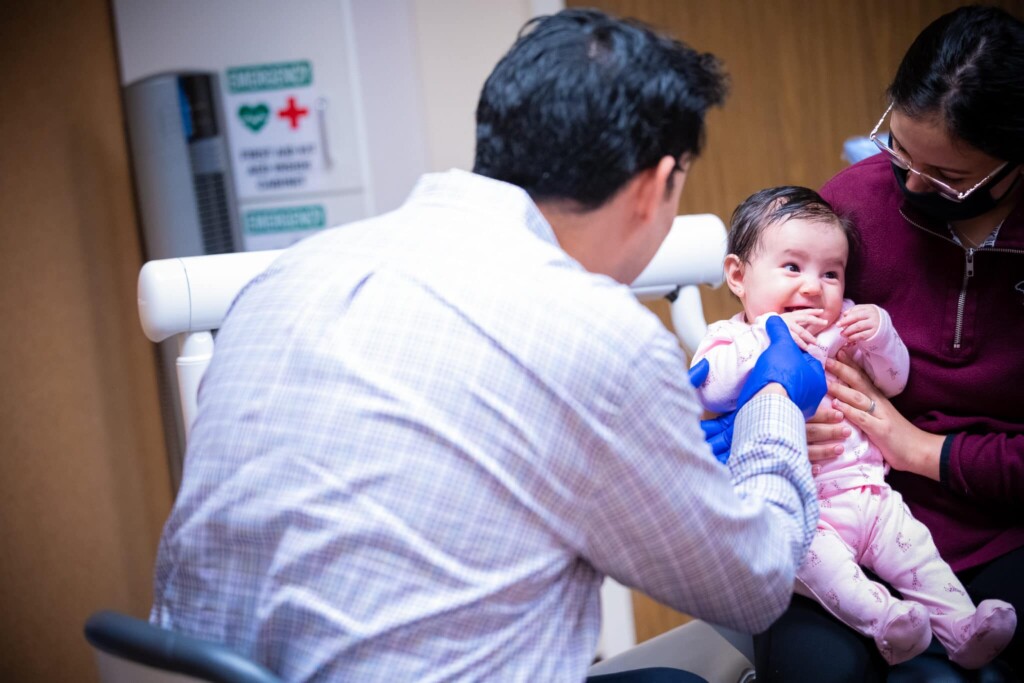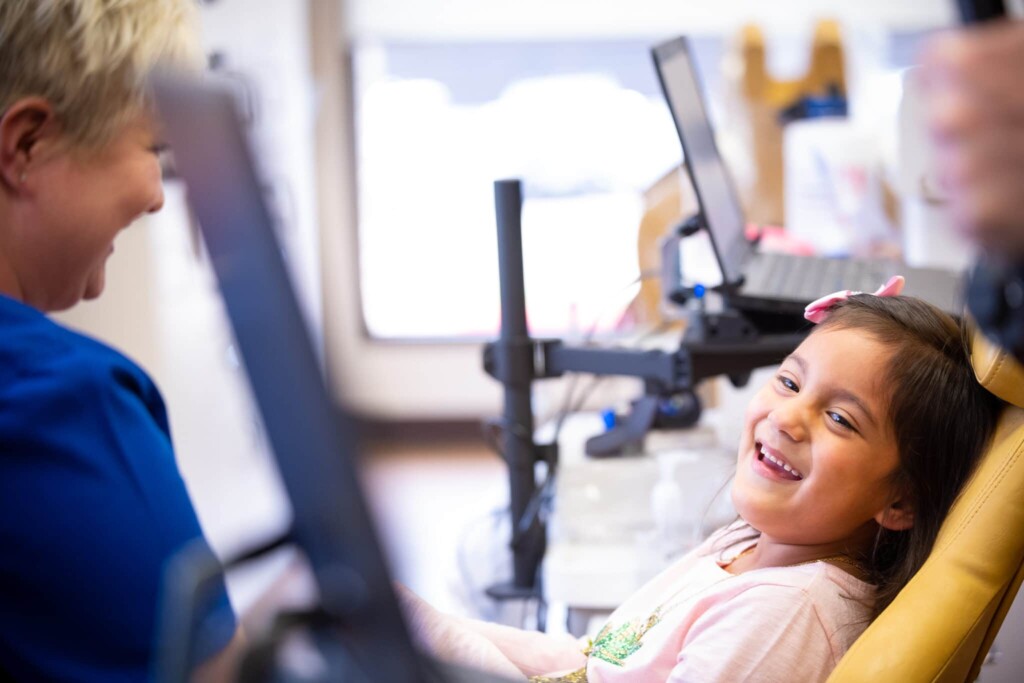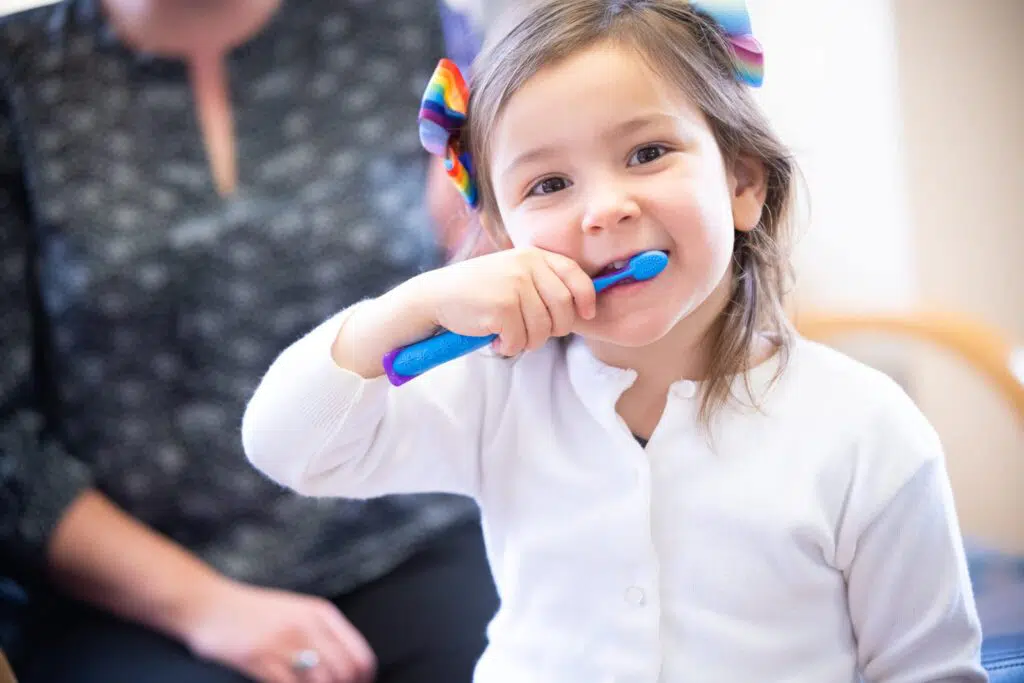First-time parents have lots of questions when it comes to their child’s dental health. Some of the most popular questions are about baby teeth. When do baby teeth come in? At what age do babies start teething? What are some of the most common baby teething symptoms? What are some of the best methods for baby teething relief?
We treat pediatric dentistry patients from infants to teenagers. We’re familiar with the concerns of first-time parents who wonder if their child’s teeth are coming in too late or falling out too soon. We are here to reassure you about your child’s dental health. Baby teeth have a general schedule of when they come in or fall out, but it varies from child to child. Just because your child’s teeth come in a little earlier or later doesn’t mean there’s a major issue.

Babies generally get their first tooth at about six months of age. You may feel the little buds just below the gums about that time. You’ll want to clean your baby’s gums after feeding gently with a washcloth. Once that first tooth erupts, the others follow fairly quickly so that by one year of age, all of your child’s baby teeth should be in. If your child still doesn’t have teeth by 18 months, it’s time to bring them in for a check by the dentist.
Chances are, you’ll know when your child starts teething. They tend to get a little cranky. But if you had a tooth poking its way through your gums, you’d probably be cranky, too — and probably were! Your child will have tender gums and will display discomfort. Some parents use cold teething rings to help ease the discomfort. There are medicines available, if necessary, but it’s a good idea not to use those too much. Try the cold teething rings first.
As we mentioned, you may feel your child’s teeth just below the gums. You may also notice your child’s gums becoming red just before a tooth erupts. Your child may also run a slight fever or have a rash or red face on the side where the tooth is erupting. They may also drool more and want to chew on things.
Once the tooth is fully through the gum, your child should start feeling better. If the discomfort persists, contact us or your child’s pediatrician.

Those cute little baby teeth won’t hang around for long. They only last about five years or so before they start falling out about age six. The teeth should come out in the same order they came in. The incisors will come out front (those “two front teeth” on top and two on bottom), then the lateral incisors (the other front teeth), the canines, the premolars, and finally the molars will come out.
It will take a lot more time for these teeth to come out. They’ll start when they’re children and won’t finish up until the wisdom teeth come in between ages 18 and 20. When it’s done, your child’s 20 baby teeth will be replaced by 32 permanent ones.
You should start cleaning your infant’s mouth after feedings. Not only does this help keep your baby’s mouth healthy, but it also gets them used to having something cleaning their mouth after meals. That makes it easier when it’s time to use an actual toothbrush.
You should start brushing your baby’s teeth as soon as the first tooth erupts. The sooner your child starts good oral habits, the better the chances they’ll keep those habits up throughout their lives. That means fewer cavities in the long run. The first tooth eruption is also a good time to start seeing a pediatric dentist. Woodhill Dental Specialties is ready to see your baby and its adorable first tooth and is ready to start your child on the road to great oral health!

Not every child is going to have straight teeth. In fact, a quarter of children will need braces at some point in their lives. However, there are things you can do to help your child’s teeth as their mouth is developing.
The best thing you can do is to wean your child off a pacifier or thumbsucking as soon as possible, preferably by age two. Over time, the pacifier or thumb can cause the developing palate (roof of the mouth) to become misshapen. It also can force the front teeth forward into an overbite or push the lower teeth backward. The teeth can become crooked as a result of pacifier or thumbsucking overuse. That’s why it’s best to stop these habits as soon as possible.
By the time your child reaches age seven, it’s a good idea to consult with an orthodontist to see if your child will need braces later.
Watching a baby's first tooth come in can be exciting yet nerve-wracking. It's even more nerve-wracking when teeth start to fall out, but it's normal. Visit Woodhill Dental Specialties in Dallas or Rockwall, TX with your child for any questions and to make an appointment. We'll help guide your child to good oral health!